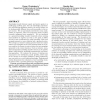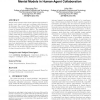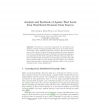550 search results - page 79 / 110 » A Design Process for Adaptive Behavior of Situated Agents |
HASE
2007
IEEE
14 years 3 months ago
2007
IEEE
This paper presents a scalable, adaptive and timebounded general approach to assure reliable, real-time Node-Failure Detection (NFD) for large-scale, high load networks comprised ...
ATAL
2006
Springer
14 years 15 days ago
2006
Springer
Knowledge transfer between expert and novice agents is a challenging problem given that the knowledge representation and learning algorithms used by the novice learner can be fund...
ATAL
2007
Springer
14 years 2 months ago
2007
Springer
Human team members often develop shared expectations to predict each other’s needs and coordinate their behaviors. In this paper the concept “Shared Belief Map” is proposed ...
ATAL
2006
Springer
14 years 15 days ago
2006
Springer
Notions of fairness have recently received increased attention in the context of resource allocation problems, pushed by diverse applications where not only pure utilitarian effic...
NEUROSCIENCE
2001
Springer
14 years 1 months ago
2001
Springer
We propose a theoretical framework for specification and analysis of a class of learning problems that arise in open-ended environments that contain multiple, distributed, dynamic...



